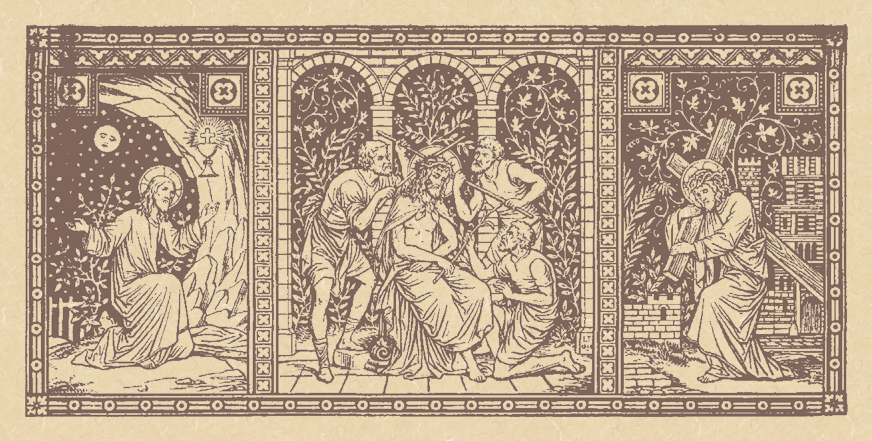Jesus Didn't Die for "Us"; He Died for "You."
The Sixth Saturday of Lent; and, the Memorial of Saint Martin I, Pope & Martyr.*
Lessons from the feria, according to the ordinary form of the Roman Rite:
• Ezekiel 37: 21-28.
• [Responsorial] Jeremiah 31: 10-13.
• John 11: 45-56.
Passion Saturday; and, the Commemoration of Saint Hermenegild, Martyr.**
Lessons from the feria, according to the extraordinary form of the Roman Rite:
• Jeremiah 18: 18-23.
• Psalm 34: 20, 22.
• John 12: 10-36.
FatherVenditti.com
|
8:54 AM 4/13/2019 — On Thursday we had reflected on how our Lord, having arrived in Jerusalem, begins to precipitate events and manipulate the various actors around Him so as to trigger the sequence of events that would lead to His passion. He does this deliberately because this is the reason He came to earth as a Man. In Thursday’s Gospel lesson, and again yesterday, He shamelessly declared Himself to be God, knowing exactly what the result would be, and that result is what we read in today’s lesson.
I've always been fascinated with Ciaphas' reasoning here: “And one of them, Caiphas, who held the high priesthood in that year, said to them, 'You have no perception at all; you do not reflect that it is best for us if one man is put to death for the sake of the people, to save a whole nation from destruction'” (John 11: 49-50 Knox). Pragmatically, he's correct: he perceives that the agitation that Jesus is causing by his preaching and His claims of divinity are creating enough of a spirit of unrest that the Romans will crack down on the Jews and take away even more of their freedoms; so, he suggests that Jesus must be eliminated for the common good.
Now, of course there's an element of jealousy involved: Jesus had just raised Lazarus from the dead, and that's a card trick that's hard to trump. In fact, today's Gospel lesson opens with that idea: “Many of these Jews who had visited Martha and Mary, and seen what Jesus did, learned to believe in him…” (v. 45). But, beyond that, there is a certain logic to his reasoning, and it's a logic that has permeated our own society: the notion that the needs of the individual must be subordinated to the common good.  It has become so ingrained in our collective psyche of late, that some have even presented it as Christian, using it to justify the superiority of the so-called “social Gospel” over dogma and spirituality, or—to put it another way—the importance of good works over purity of life and the striving for individual holiness. It has become so ingrained in our collective psyche of late, that some have even presented it as Christian, using it to justify the superiority of the so-called “social Gospel” over dogma and spirituality, or—to put it another way—the importance of good works over purity of life and the striving for individual holiness.
This time of year, we always hear and talk about our Blessed Lord suffering and dying for the sins of mankind, but what is "mankind"? Mankind is you, mankind is me, mankind is not some collective entity. Jesus didn't suffer and die to redeem a collective; he suffered for you, he suffered for me. Our relationship to the Passion of our Lord is a deeply personal and individual one.
As we enter this coming week into the commemoration of our Lord’s Passion, it is important for us to be convinced that the Lord is doing this “for you.” Not for us, not for the world, not for mankind, but for you. For me. He is God; and, as God, He can look at me, look at you, look at each of us all at once, as if He's looking at no one else. We can't do that, but He can. When we confess our sins we are conscious of the fact that He's hearing us alone and forgiving us alone, probably because we're in a tiny little room; why can't we do that when we relive His Passion and death? Why can't we do that when we approach Him in purity of heart to receive Him in Holy Communion? We can, but we often don't.
So, as we enter into the Passion of our Lord, let's resolve to take the advice of Saint Ignatius: as we hear the Gospel lessons of the Sacred Triduum, let's—each of us—put ourselves in the scene. As our Lord is walking by carrying the heavy cross, watch Him closely, and you'll notice Him look over His shoulder and cast a glace in your direction. See His eyes fix on you and on no one else, and know that He is doing this for you.

* Because Lent began on a Wednesday, today is the sixth Saturday. Cf. the post here under the heading "Hey, aren't you off by a week?" for an explanation of how the days of the liturgical calendar are rendered on this site as opposed to how they are designated in the Roman Missal.
As a deacon, Martin served at the imperial court in Constantinople, but combated Emperor Constans II over the Monothelite heresy that Christ had only a divine will and was thus not truely human. After his election as pope, he was forced from Rome to return to Constantinople, where he was tried for treason and exiled to Crimea, where he died of starvation and ill-treatment. He was the last pope recognized as a martyr.
** The son of the King of the Visigoths in Spain, Hermenegild was put to death by the Arians in 586 out of hatred for his faith in the consubtantiality of the Word of God with the Eternal Father.
|

